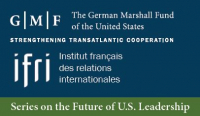Gateway to Think Tanks
| 来源类型 | Publications - Editorials - Chroniques américaines |
| 规范类型 | 评论 |
| Global Swing States and U.S. Strategy Series on the Future of U.S. Leadership, August 2013 | |
| Daniel KLIMAN | |
| 发表日期 | 2013-08-30 |
| 出处 | Chroniques américaines |
| 出版年 | 2013 |
| 概述 | Defending and renewing the global order is a priority for the United States and Europe. An important part of this effort will be accomplished if transatlantic partners can successfully engage four “global swing states” — Brazil, India, Indonesia and Turkey — in the management of global issues,... |
| 摘要 |
Global Swing States and U.S. Strategy Series on the Future of U.S. Leadership, August 2013
Defending and renewing the global order is a priority for the United States and Europe. An important part of this effort will be accomplished if transatlantic partners can successfully engage four “global swing states” — Brazil, India, Indonesia and Turkey — in the management of global issues, because of their geopolitical and economic status, as well as their desire to have a stronger voice in the various international forums. Successful engagement of these nations will be key to preserving the international order and U.S. leadership.  At a time of growing challenges to international peace and prosperity and intensifying resource constraints, working with emerging powers to defend and renew the global order has become increasingly central to U.S. strategy. Compared to the Asia “pivot” unveiled during the first Obama administration, U.S. engagement of emerging powers has generated little publicity and comparatively modest interest from longtime U.S. partners in Europe. Yet the stakes are high. The choices made by a handful of economically dynamic, strategically located, rising democracies — “global swing states” — may decisively nudge the international order toward renewal or fragmentation. If the United States, its transatlantic allies, and these key emerging powers can come together to strengthen a system on which all depend, they are more likely to thrive. If the global order instead becomes less cohesive, they — and the broader world — will suffer the consequences.
Global Swing States and U.S. Strategy
|
| 关键词 | American foreign policy Grand strategy Brazil India Indonesia Turkey United States |
| URL | https://www.ifri.org/en/publications/enotes/global-swing-states-and-us-strategy |
| 来源智库 | French Institute of International Relations (France) |
| 资源类型 | 智库出版物 |
| 条目标识符 | http://119.78.100.153/handle/2XGU8XDN/415757 |
| 推荐引用方式 GB/T 7714 | Daniel KLIMAN. Global Swing States and U.S. Strategy Series on the Future of U.S. Leadership, August 2013. 2013. |
| 条目包含的文件 | ||||||
| 文件名称/大小 | 资源类型 | 版本类型 | 开放类型 | 使用许可 | ||
| logogmfifri.jpg(22KB) | 智库出版物 | 限制开放 | CC BY-NC-SA |  浏览 | ||
| klimangssandusstrate(157KB) | 智库出版物 | 限制开放 | CC BY-NC-SA | 浏览 | ||
除非特别说明,本系统中所有内容都受版权保护,并保留所有权利。